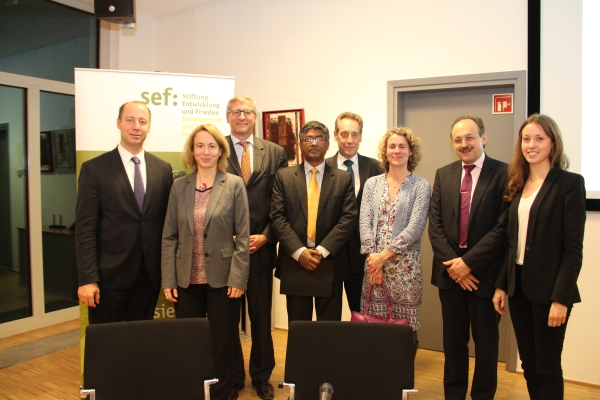Conference language: English
Most products on sale in Europe represent the end point in a long global supply chain. Most of them come from suppliers on the other side of the world – from China, Bangladesh or Vietnam. However, catastrophic accidents along these globalized supply chains are by no means uncommon. In Germany and other countries, this has led to the formation of new Textiles Partnerships. Alliances of this kind are most likely to effect change when they have broader transnational support, so it is very gratifying that this issue is being addressed at EU level as well; the European Commission is planning to launch a new initiative before the end of 2015.
With their Policy Briefing, the Development and Peace Foundation (sef:) and its cooperating partners, the German Federal Ministry for Economic Cooperation and Development (BMZ), CIDSE - International Alliance of Catholic Development Agencies and the Representation of the State of North Rhine-Westphalia to the European Union, will analyse and critique this process.
Key questions to be addressed are:
- How ambitious are these initiatives in terms of their specific objectives and timetables?
- To what extent should international responsibility be voluntary?
- How can national initiatives such as Germany’s Textiles Partnership tie in with European and international initiatives and institutions in order to harmonize standards and thus avoid distortions of competition?
- How can companies wishing to join this type of initiative be assisted in auditing and monitoring their supply chains?
- What lessons should be learned from non-compliance? For example, why did it take more than two years to reach the USD 30 million target for the Rana Plaza Donors Trust Fund, set up to provide compensation for victims and their families? How can support be mobilized more quickly in future?
- How can and must the responsible persons at the local level (policy-makers, construction companies, factory owners and security staff, etc.) be held to account?
Cooperating Partners
German Federal Ministry for Economic Cooperation and Development (BMZ), Berlin/Bonn
CIDSE - International Alliance of Catholic Development Agencies, Brussels
Representation of the State of North Rhine-Westphalia to the European Union, Brussels


